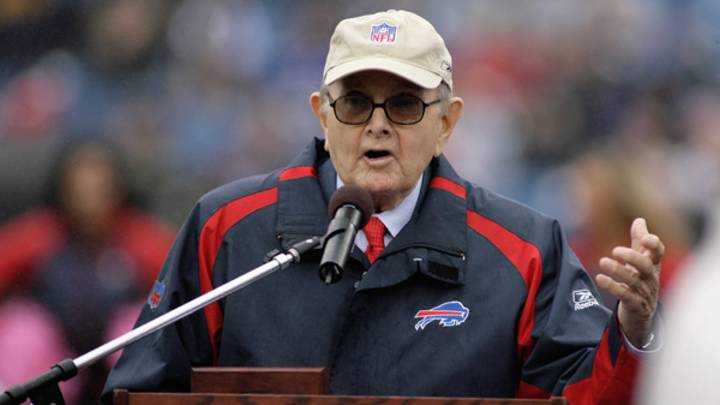Bills owner Ralph Wilson Jr. dies at 95

Ralph Wilson Jr. was one of pro football's most important owners. (Rick Stewart/Getty Images)
Ralph Wilson Jr., the only owner the Buffalo Bills have ever known and the last surviving member of the eight original American Football League team owners, died Tuesday. He was 95. Bills CEO and team president Russ Brandon announced the news at the owners meetings in Orlando, Fla. Wilson had given control of the team to Brandon in 2013 -- the only other time he had done so was to Tom Donahue in 2001, and he took his presidency back in 2006.
“I speak for everyone within the Bills organization when I say that we are all suffering a deep and profound sadness with the passing of our Hall of Fame owner Mr. Wilson," Brandon said in a statement. "We have lost our founder, our mentor, our friend, and this is a very difficult time for us all. We extend our deepest sympathies to his wife Mary, his daughters Christy and Dee Dee [Edith], his niece Mary and his entire family.
"Mr. Wilson had a relentless passion, a deep love for his Buffalo Bills, the City of Buffalo and the National Football League. He also loved the Bills fans and all of the people of Western New York who embraced the Bills.
"This incredible man was the personification of the Buffalo Bills. His life was grit, determination and resolve. He was bigger than life in many ways and yet he was the everyday man, driving his Ford Taurus to the local store and greeting everyone as they called out 'Hi Ralph!' He will be greatly missed by those in our community whose lives he touched."
[si-nfl-player id="81acc23aef7a42deb358dc0eb440182e"]
Born in Columbus, Ohio on Oct. 18, 1918, Wilson grew up in Detroit and served in World War II with the United States Navy. When he got out of the service, he took over his father's insurance business and made several successful investments. That led to two things: The formation of Ralph Wilson Industries, and Wilson's place as a minority owner of the Detroit Lions in the 1950s. But when he heard of Lamar Hunt's plan to form a new football league in 1959, Wilson was all in. After an abortive attempt to establish a franchise in Miami, Wilson chose Buffalo as his team's location.
Through the threadbare early years of the American Football League, which started play in 1960, Wilson was one of the most financially stable team owners. He once loaned the Oakland Raiders $400,000 just to stay solvent, because losing one of the original eight teams could have meant the death of the league. He was also key to the AFL's decision to avoid playing games the Sunday after the assassination of President John F. Kennedy in November 1963. He was also a big part of the AFL's decision to implement revenue sharing among all teams, which led to major profits throughout the league as television networks looked to sign more lucrative contracts and the league became more popular, and on pace with the NFL. Through the 10-year history of the AFL, not a single team folded, and more teams were added after the merger with the NFL in 1966.
In that regard, Wilson was just as important to the furtherance of professional football as anyone of his early era.
The Bills went though the 1970s without much success in a win-loss sense, but things turned around in the mid-1980s, when the addition of general manager Bill Polian and a crack scouting staff laid the foundation for a Bills teams what went to four straight Super Bowls from 1990 through '93. That the franchise lost all four of those games shouldn't outshine the rarity of such an achievement.

SI.com contributing NFL writer and Seattle resident Doug Farrar started writing about football locally in 2002, and became Football Outsiders' West Coast NFL guy in 2006. He was fascinated by FO's idea to combine Bill James with Dr. Z, and wrote for the site for six years. He wrote a game-tape column called "Cover-2" for a number of years, and contributed to six editions of "Pro Football Prospectus" and the "Football Outsiders Almanac." In 2009, Doug was invited to join Yahoo Sports' NFL team, and covered Senior Bowls, scouting combines, Super Bowls, and all sorts of other things for Yahoo Sports and the Shutdown Corner blog through June, 2013. Doug received the proverbial offer he couldn't refuse from SI.com in 2013, and that was that. Doug has also written for the Seattle Times, the Washington Post, the New York Sun, FOX Sports, ESPN.com, and ESPN The Magazine. He also makes regular appearances on several local and national radio shows, and has hosted several podcasts over the years. He counts Dan Jenkins, Thomas Boswell, Frank Deford, Ralph Wiley, Peter King, and Bill Simmons as the writers who made him want to do this for a living. In his rare off-time, Doug can be found reading, hiking, working out, searching for new Hendrix, Who, and MC5 bootlegs, and wondering if the Mariners will ever be good again.